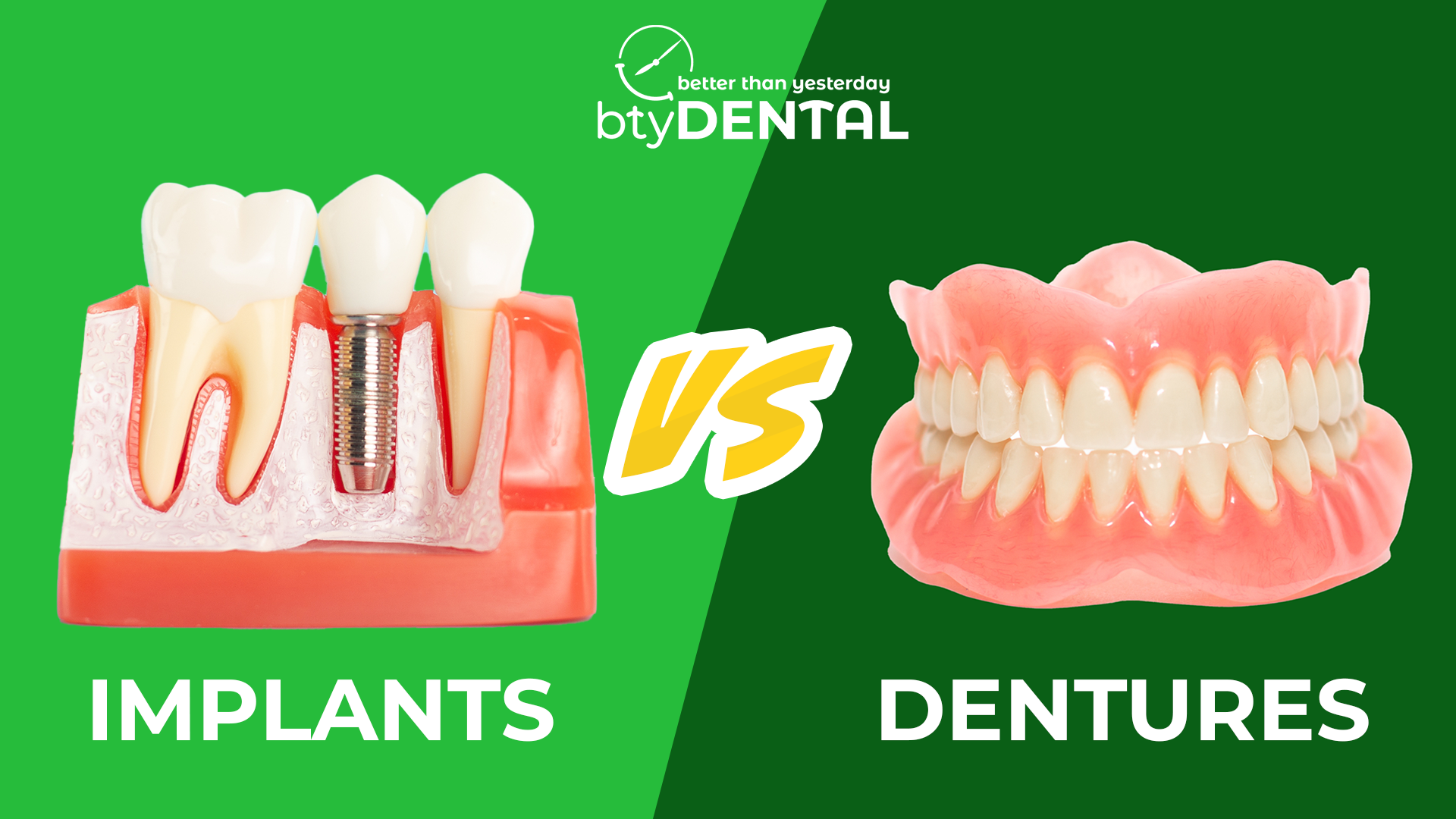
If you’re missing multiple teeth or facing the possibility of losing them, you’ve probably started comparing dentures vs. implants. Both are common tooth replacement options, but they work—and feel—very differently.
Dentures vs. Implants: What’s the Difference?
Traditional dentures are removable teeth replacements that sit on top of your gums. They’re a popular choice for patients looking for a quick and affordable way to restore their smile. However, dentures can sometimes slip or feel unstable when you eat or speak. They also don’t prevent bone loss in your jaw over time.
Dental implants, on the other hand, are permanent posts placed in your jawbone to hold crowns, bridges, or even dentures in place. Implants are often recommended for people looking for a long-term, stable solution that feels more like natural teeth.
While they cost more upfront and require minor surgery, they offer long-term benefits like preserving your jawbone and improving chewing strength. If you’re considering full-arch solutions like All-on-4 implants, check out our All-on-4 dental implant pricing in Washington for more details. You can also explore our full arch dental implant procedure guide to understand the process step by step.
If you’re weighing these options, one of the biggest questions is how much they cost.
Dentures vs. Implants Cost Comparison
When comparing dentures vs implants cost, it helps to look at the full picture—not just the initial price tag. Here’s what you can generally expect to pay for each option in Washington:
Traditional dentures are typically the most budget-friendly choice. You can expect to pay between $1,000 and $3,000 per arch. While the lower price is appealing, keep in mind that dentures may need to be replaced every few years and require ongoing adjustments to maintain the fit.
Snap-in dentures fall somewhere in the middle. These are supported by implants but remain removable. The snap in dentures cost usually ranges from $6,000 to $12,000 per arch, depending on how many implants are placed. If you’re wondering how much implant dentures cost in Washington, this is a great place to start your research.
Dental implants are the most stable and permanent option. A full set of implant-supported teeth—often called All-on-4 or fixed implant dentures—can cost $15,000 to $25,000 or more per arch. This higher upfront cost reflects the surgical placement, the number of implants, and the long-term durability of the result.
If you’re comparing permanent dentures vs implants cost, it’s worth considering that while both options can last for years, fixed implants typically offer the most natural feel and function.
Snap-In Dentures vs. Implants: Pros and Cons
Both snap-in dentures and dental implants offer more stability than traditional dentures—but they come with different benefits, costs, and care requirements.
Snap-in dentures are removable but lock into place using dental implants. This makes them more secure than regular dentures, especially when eating or speaking. They’re also easier to clean since you can remove them for daily hygiene.
Many patients choose snap-ins because they offer the benefits of implants without the full cost of a fixed solution. If you’ve been researching “how much do snap in dentures cost” or “how much does snap in dentures cost”, you’ll find that they’re generally more affordable than full fixed implants but more secure than traditional dentures.
Dental implants, on the other hand, are fixed in place. Once the implants and crowns or bridges are placed, they stay in your mouth permanently. This makes them feel and function the most like natural teeth. While they have a higher price tag, many patients prefer the long-term convenience and bone preservation benefits of implants. If you smoke, be sure to review what to know about smoking with dental implants before moving forward with treatment.
When comparing snap in dentures vs implants cost, snap-ins tend to have a lower initial price, but implants typically require less maintenance and fewer replacements over time. To avoid common pitfalls, check out why dental implants sometimes fail.
Which Option Is Right for You?
Choosing between dentures, snap-in dentures, and dental implants really comes down to your priorities—whether that’s cost, comfort, or long-term value.
If you’re on a tighter budget or need a fast solution, traditional dentures are the most affordable place to start. Just keep in mind that they may need to be replaced or relined every few years.
If you want more stability without committing to the full cost of permanent implants, snap-in dentures offer a great middle-ground. They snap securely onto implants for added confidence while eating and speaking, yet remain removable for easy cleaning.
If you’ve been wondering “how much are snap in dentures” or looking for an estimated price on snap in dentures, remember they typically range from $6,000 to $12,000 per arch.
If you’re looking for the most natural, long-lasting solution, dental implants are the gold standard. While permanent dentures vs implants cost may seem similar on paper, the long-term value of implants—better chewing power, bone preservation, and a permanent fit—makes them the preferred choice for many patients. To learn more about which type of implant might be right for you, check out our guide to the different types of dental implants.
Schedule Your Consultation at btyDENTAL Washington
Still weighing the pros and cons of dentures vs implants? Whether you’re looking for the most budget-friendly option or a long-term, permanent solution, our team at btyDENTAL Washington is here to help you make the right choice for your smile.
Schedule your consultation today and let us help you take the next step toward a smile that’s better than yesterday.

